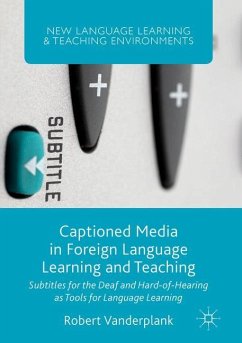This book brings together current thinking on informal language learning and the findings of over 30 years of research on captions (same language subtitles for the deaf and hard-of-hearing) to present a new model of language learning from captioned viewing and a future roadmap for research and practice in this field. Language learners may have normal hearing but they are 'hard-of-listening' and find it difficult to follow the rapid or unclear speech in many films and TV programmes. Vanderplank considers whether watching with captions not only enables learners to understand and enjoy foreign language television and films but also helps them to improve their foreign language skills. Captioned Media in Foreign Language Learning and Teaching will be of interest to students and researchers involved in second language acquisition teaching and research, as well as practising language teachers and teacher trainers.
"This book addresses a much debated topic in the research on foreign language teaching and learning: the role of captioned audiovisuals for educational purposes. ... The book can also offer valuable insights to independent learners who wish to study or practice foreign languages by means of captioned multimedia tools." (Annamaria Caimi, TESOL Quarterly, Vol. 51(4), December, 2017)
"I found the book very informative, well organised, and easy to read. Vanderplank's work remains fresh and relevant, and the volume will be of great interest to students and researchers interested in L2 learning, as well as practicing language teachers and teacher trainees." (Danijela Trenkic, System, Vol. 65, April, 2017)
"I found the book very informative, well organised, and easy to read. Vanderplank's work remains fresh and relevant, and the volume will be of great interest to students and researchers interested in L2 learning, as well as practicing language teachers and teacher trainees." (Danijela Trenkic, System, Vol. 65, April, 2017)








